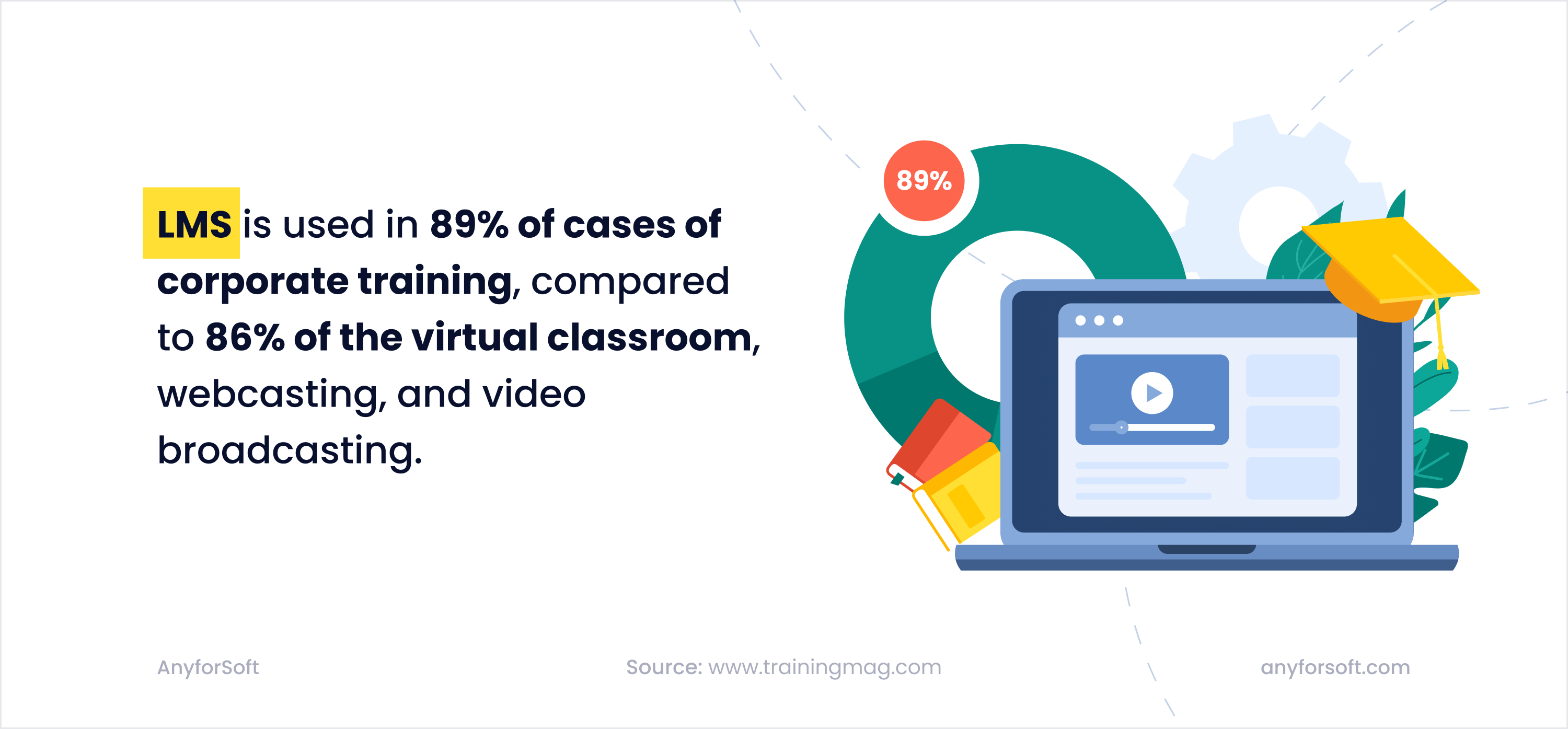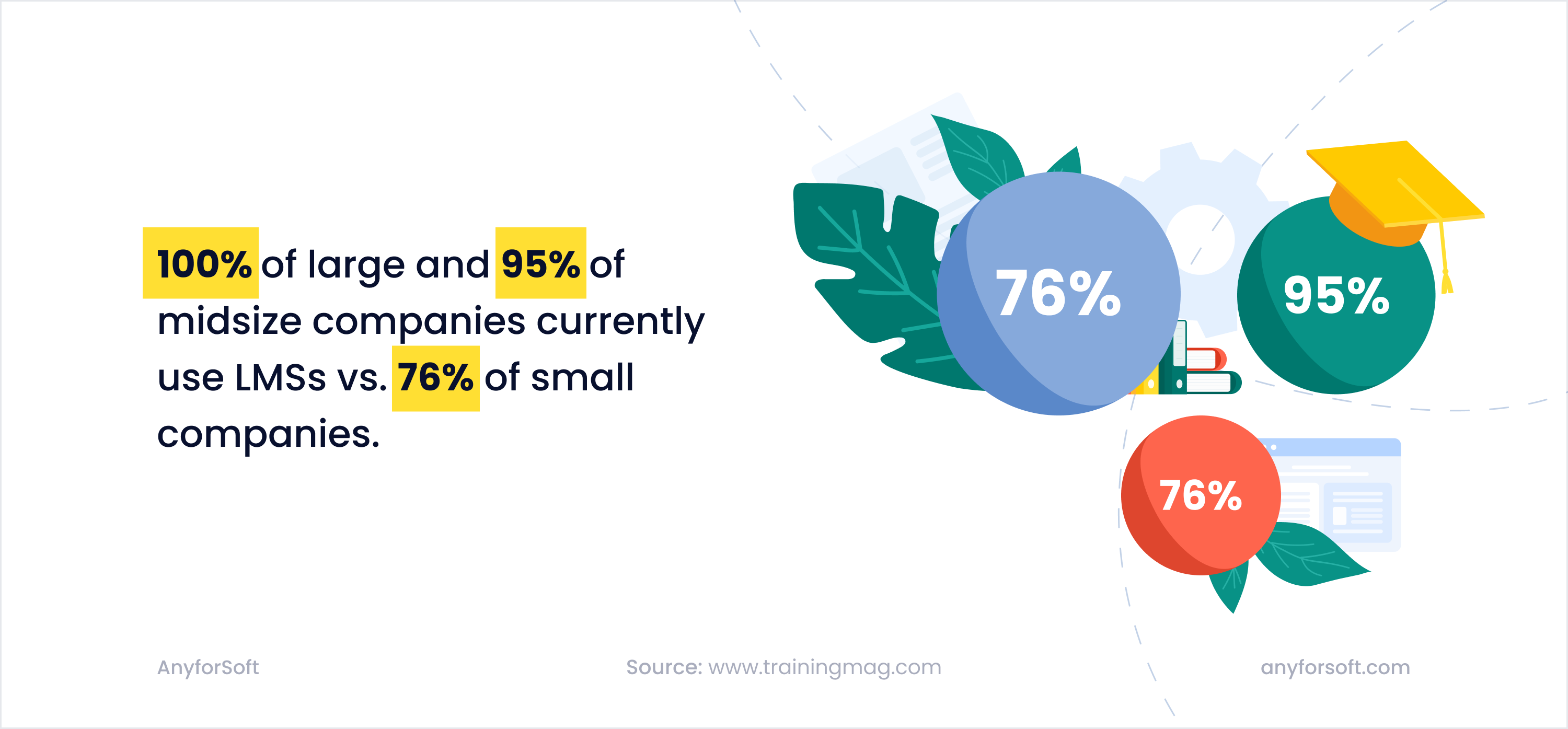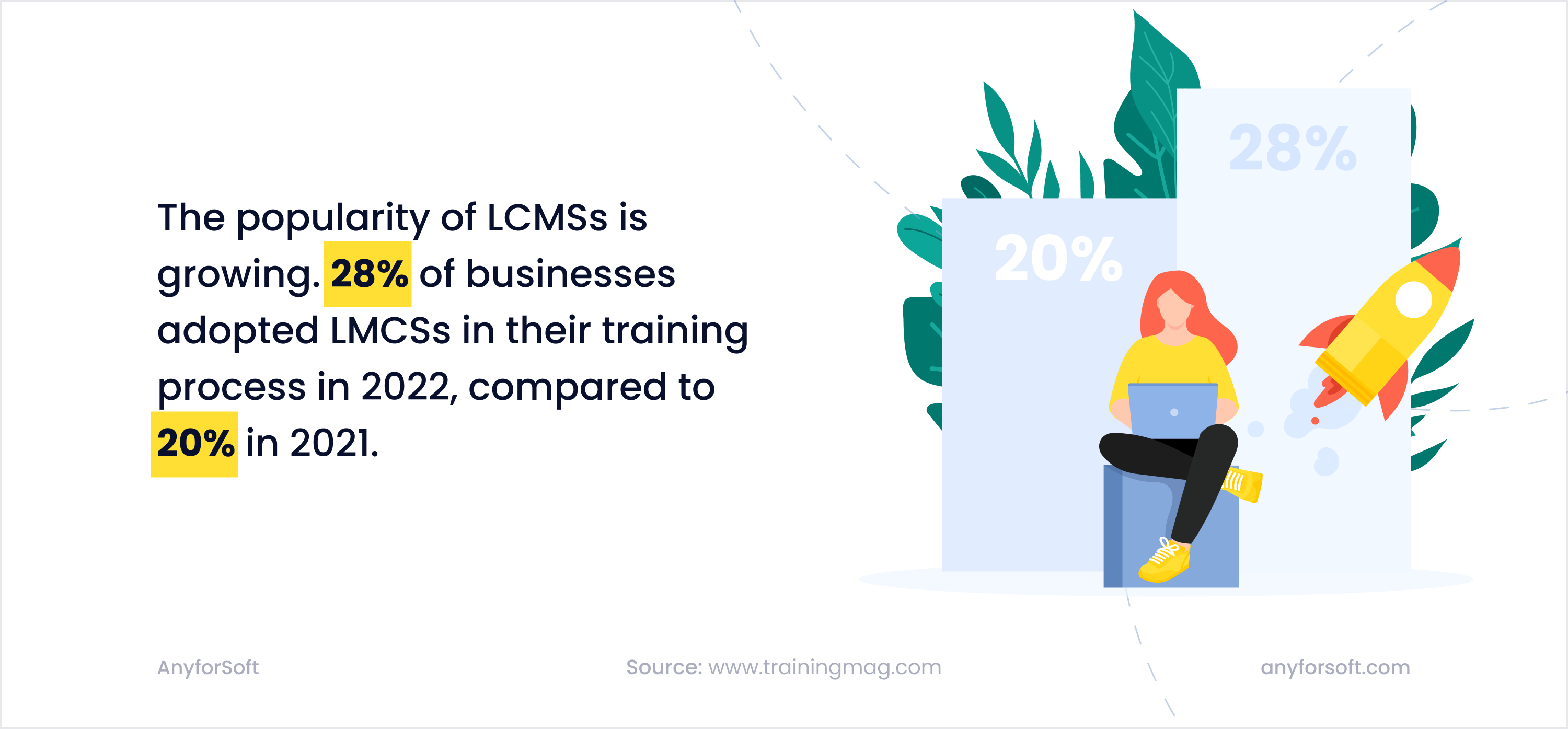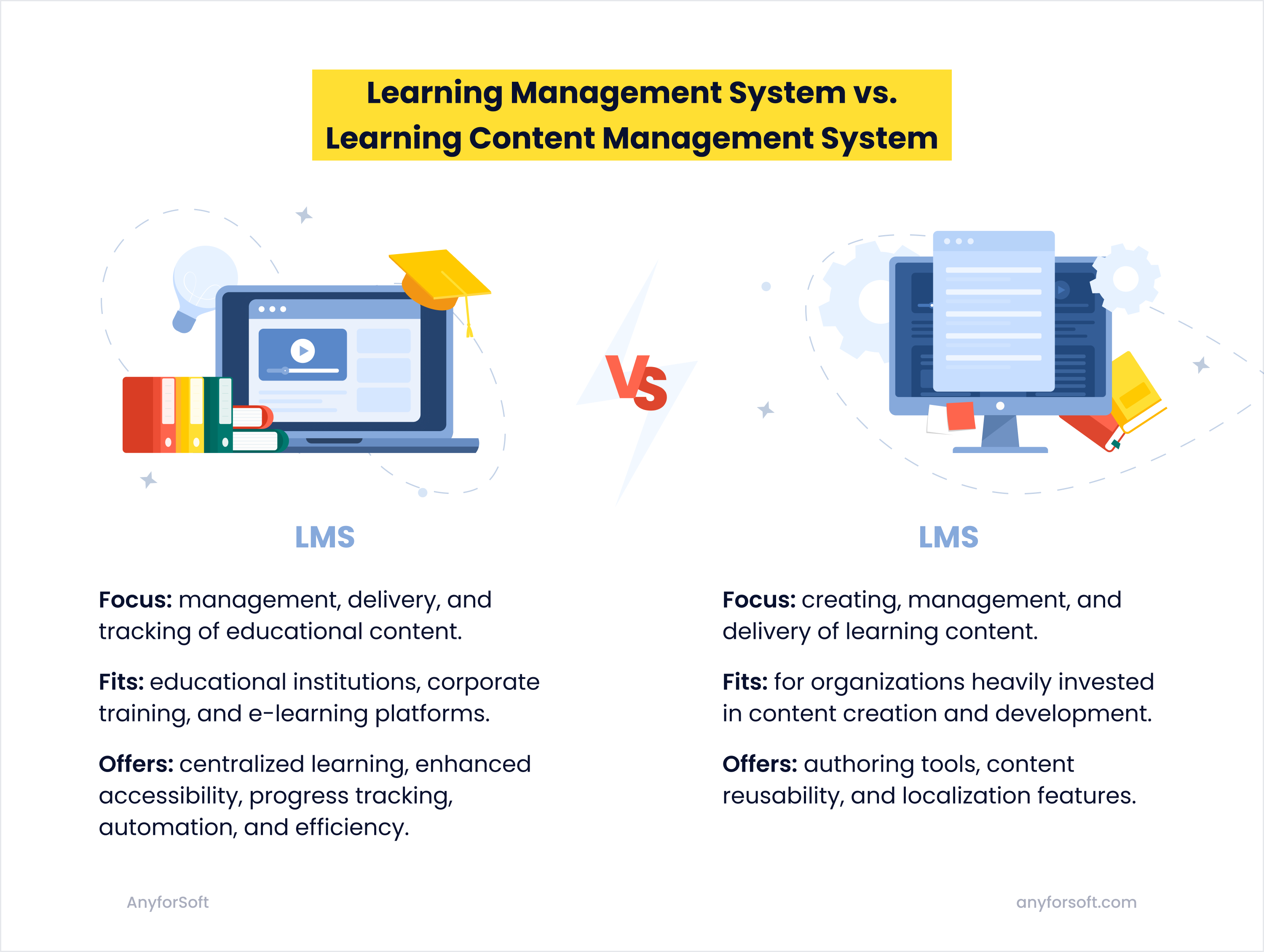Today's E-learning business is one of the industry's most promising directions, forcing companies to look for new ways and development tools, for example, creating learning management systems and customizing learning content management systems, adapting to personal needs, or providing online training services to the general public. All this requires a deep understanding of the toolkit, its functionality, and its differences. A comparison often arises between LMS and LCMS, which can confuse anyone but an experienced LMS development company. While you have only an idea, let's figure out together, based on simple criteria, what is what and what exactly you need.
What is a Learning Management System (LMS)?
In short, a learning management system (LMS) is a software application designed to facilitate the management, delivery, and tracking of educational content and training programs. It provides a centralized platform for organizations to create, distribute, and manage learning materials, track learners' progress, and administer assessments. LMSs are commonly used in educational institutions, corporate training, and e-learning platforms. When considering a learning management system (LMS) for your organization, you may explore the benefits of custom LMS development tailored to meet your specific needs and requirements.

Core Benefits
For the last few years, LMS has become a popular and widespread instrument for corporate and individual training, and here is why:
- Centralized Learning: LMSs offer a centralized repository where training materials, such as courses, modules, and resources, can be organized and accessed by learners. This enables easy content management and ensures consistency in learning delivery.
- Enhanced Accessibility: LMS software provides learners access to learning materials anytime, anywhere. They can access the content from different devices, facilitating self-paced learning, accommodating diverse preferences, and leveling up learning experiences.
- Progress Tracking: it offers robust tracking and reporting capabilities, allowing administrators and instructors to monitor learners' progress, completion rates, and assessment scores. This helps identify improvement areas and measure the blended learning programs' effectiveness.
- Automation and Efficiency: LMS streamlines administrative tasks such as course enrollment, learner registration, and certificate issuance. Automation reduces manual effort, saves time, and improves operational efficiency.
Successful LMS implementation involves careful planning, configuration, and training to ensure a smooth transition and effective system utilization across your organization.

Core Features
Some features of LMS vs. LCMS may be more important or valuable for your specific needs and goals, and while the list below is incomplete, these options are usually essential and must-haves.
- Course Management: enabling the creation and organization of courses, including structuring content, adding multimedia elements, and setting up assessments and quizzes, providing each participant with a personalized learning experience.
- Learner Management: providing tools for managing learner profiles, enrollment, and progress tracking. Training managers can easily add or remove individual learners, assign courses, and monitor personal or group performance.
- Communication and Collaboration: include features for discussion forums, chat functionality, and messaging systems to facilitate interaction and collaboration among learners and instructors.
- Assessment and Grading: allow the creation and administration of examinations, quizzes, and exams. They provide automatic grading and feedback mechanisms, reducing manual grading efforts.
Understanding the critical differences between an LMS and a learning experience platform (LXP) is crucial in selecting the right solution for your organization's e-learning initiatives. Feel free to learn more about LMS vs. LXP in our article.
Who needs an LMS?
- Educational institutions. Schools, colleges, and universities use LMS to deliver online courses, manage student enrollment, track progress, and administer assessments.
- Corporate training departments. Companies use learning management systems to onboard new employees, deliver compliance training, and provide ongoing professional development courses.
- Government agencies. Public sector organizations utilize LMS to train employees, provide resources for citizens, and disseminate information.
- Nonprofit organizations. Nonprofits use LMS for online training volunteers and educating stakeholders.
- Professional associations. A robust LMS solution helps professional associations provide continuing education courses for members, manage certifications, and foster collaboration among professionals.
What is a Learning Content Management System (LCMS)?
Why may you need another tool? A learning content management system (LCMS) is a specialized software platform that focuses on creating, managing, and delivering learning content. Unlike LMSs, which primarily focus on administering and tracking learning activities, LCMSs provide a robust authoring tool and content creation options.
Core Benefits
While LCMS vs. LMS has another spotlight, it also can be helpful in online learning.
- Content Authoring and Reusability: LCMS platforms offer powerful authoring capabilities that allow instructional designers and subject matter experts to create interactive and engaging learning content. The modular nature of LCMSs enables the reuse of training content components, reducing duplication and saving time.
- Content Versioning and Control: it provides version control features, ensuring that a content creator can track changes, collaborate on content creation, and maintain a history of revisions. This facilitates content management and ensures accuracy and consistency.
- Content Localization and Translation: LCMS supports the translation and localization of learning content, making it easier to deliver training programs to a global audience. Content can be adapted to specific languages, cultures, or regional requirements.
Core Features
Not only the purpose but the features also highlight the difference between LCMS and LMS.
- Content Creation and Management: providing a toolkit for creating, editing, and organizing e-learning content. These tools may include authoring interfaces, multimedia integration, and content templates for a consistent design.
- Content Collaboration: enabling collaboration among designers, subject matter experts, and content creators. They provide features such as workflow management, review cycles, and content approval processes.
- Content Reusability and Personalization: allowing content components to be reused across multiple training courses or modules, promoting efficiency in workflows. They also support personalization, enabling learners to access customized digital learning paths or tailored content based on their needs.

Who needs an LCMS?
- Content developers and learning managers. LCMS platforms are essential for professionals and teams responsible for creating and managing e-learning content. This includes instructional designers, content developers, and subject matter experts.
- Large enterprises. Companies with complex training needs, such as multiple departments or global offices, benefit from learning content management systems for centralized content creation, storage, and distribution.
- Organizations with customized learning content. LCMS platforms are ideal for organizations that require highly customized learning content tailored to specific roles, industries, or compliance requirements.
- Training outsourcing companies. Businesses that provide employee training services to other organizations find LCMS valuable for efficiently managing and delivering tailored content to their clients.
- Regulated industries. Industries such as healthcare, finance, and aviation, which have stringent compliance requirements, often rely on LCMS to ensure accurate and up-to-date training materials.
What is a Content Management System?
Another acronym that can be confusing is CMS. A content management system (CMS) is a broader software platform for managing content creation, modification, and publication. While LMSs and LCMSs are specific to learning and training, content management systems are used for various industries and sectors for different purposes, including:
- Website Management: providing templates, themes, and plugins that simplify creating and updating web pages.
- Document Management: widely used for organizing and managing digital documents within an organization.
- Content Publishing: aiding the publishing of digital content, such as articles, blog posts, news updates, and multimedia files.
- E-commerce: offering e-commerce functionality, allowing businesses to create and manage online stores.
Understanding the meaning and purpose of different platforms makes comparing LMS vs. CMS vs. LCMS quite simple.
Exploring the key differences between LMS and LCMS: LMS and LCMS Comparison
What is the difference between an LMS and an LCMS?
When comparing a learning content management system vs LMS, it's essential to understand their primary focuses. LMS excels in managing blended learning activities, tracking progress, and facilitating learner engagement. On the other hand, LCMS is tailored for training content creation, versioning, and collaboration among authors.
While both LMS and LCMS share some common features, such as course management and progress tracking, LCMSs offer additional capabilities specific to content creation and management. LCMSs provide more sophisticated authoring tools, content reusability, and localization features, making them ideal for organizations heavily invested in content development.
By the way, using technology flexibility and capabilities, you can create LMS with Drupal that aligns perfectly with your organization's needs and preferences and can be easily customized in the future.
LMS or LCMS: Which Solution to Choose?
The choice between a learning content management system vs. a learning management system depends on your organization's specific needs and priorities. Consider the following factors when making a decision:
- Content Development Requirements: If your organization focuses on creating and managing extensive learning content, an LCMS might be better. They offer advanced authoring tools, content reuse capabilities, and collaboration features that enhance content development efficiency.
- Administrative and Tracking Needs: If your primary concern is managing learning activities, tracking learner progress, and delivering courses, an LMS would be a suitable option. They excel in providing a centralized platform for content delivery, learner management, and progress tracking.
- Budget and Resources: Evaluate your budget and available resources for implementation and maintenance. LMSs are generally more cost-effective and easier to deploy, while LCMSs often require more investment due to their advanced content development features.
- Integration and Scalability: Consider your organization's infrastructure and any potential integration requirements with other systems or tools. Evaluate the scalability and flexibility of the LMS vs. LCMS solution to accommodate future growth and evolving needs.

Ultimately, selecting the right solution involves understanding your organization's specific requirements, considering the benefits and features offered by each system, and assessing the long-term goals of your learning and training initiatives. Moreover, e-learning software development is pivotal in creating interactive and engaging digital learning experiences that can be seamlessly integrated with your chosen LMS or LCMS.
If you have an e-learning idea and are ready to implement it, contact our managers and discuss the future project. Our product development team, that cares about the result, is prepared to turn your insights into successful e-learning solutions.
